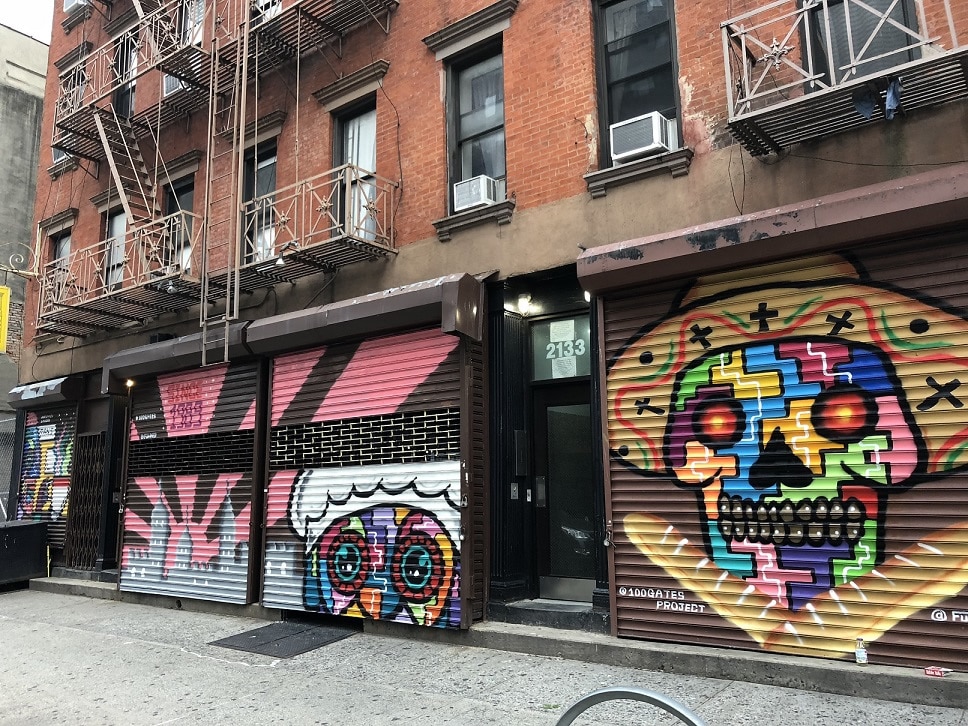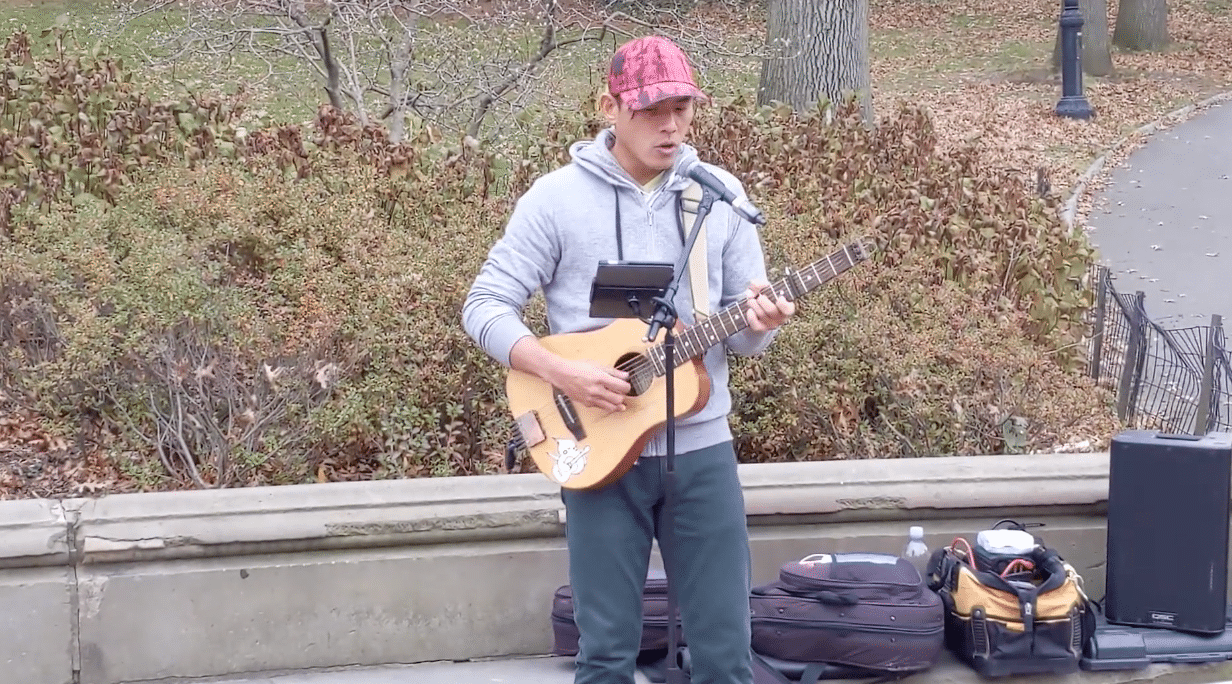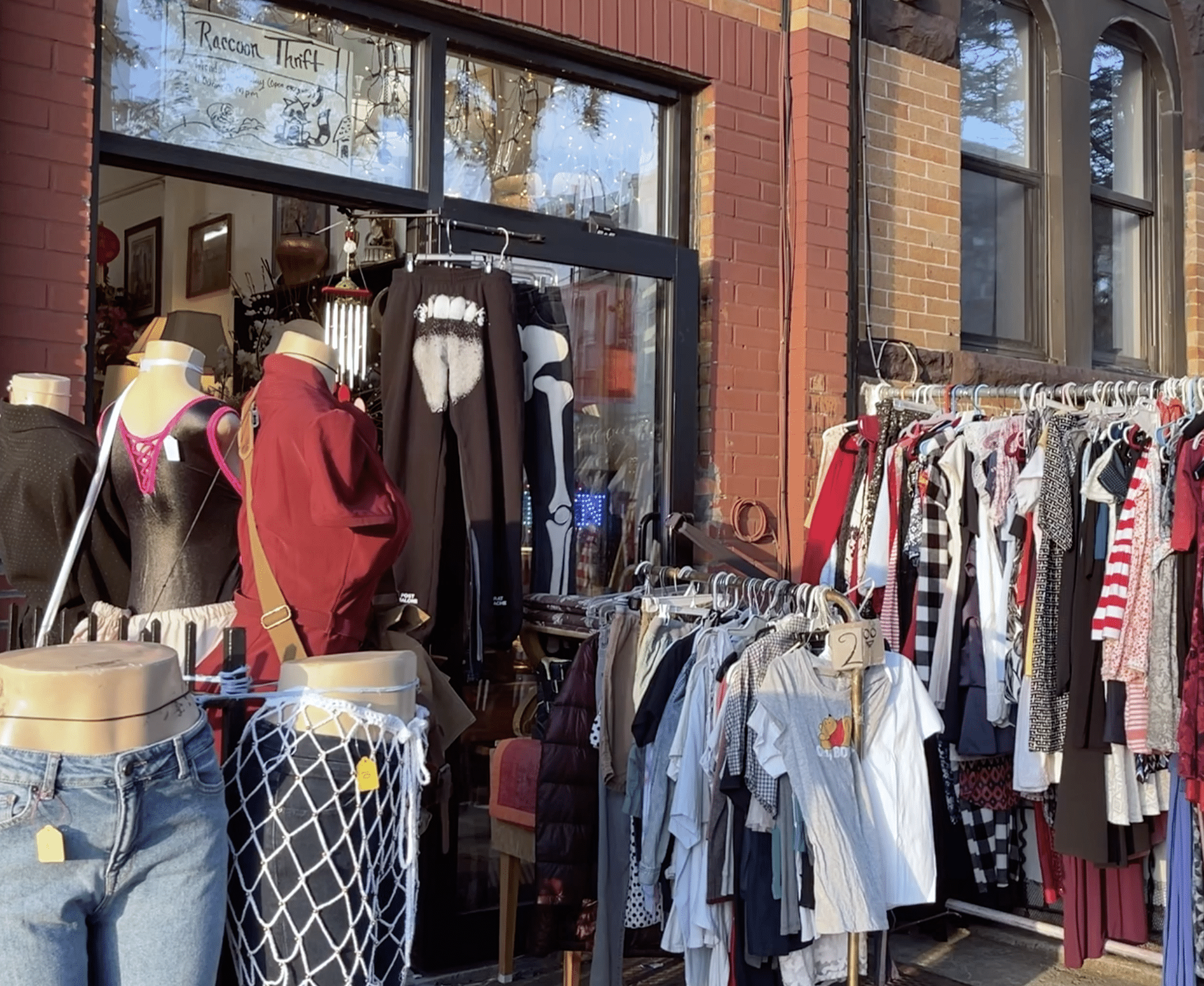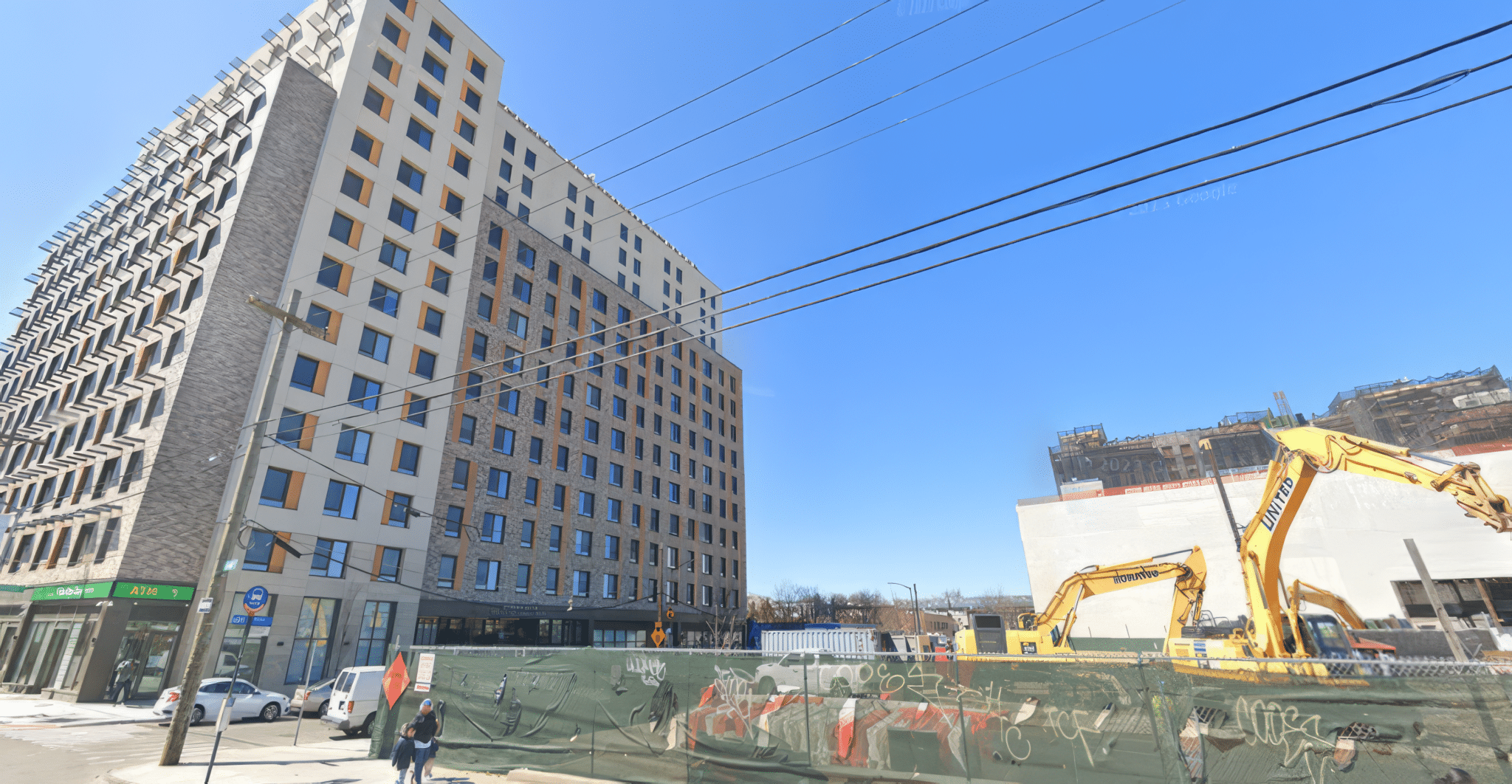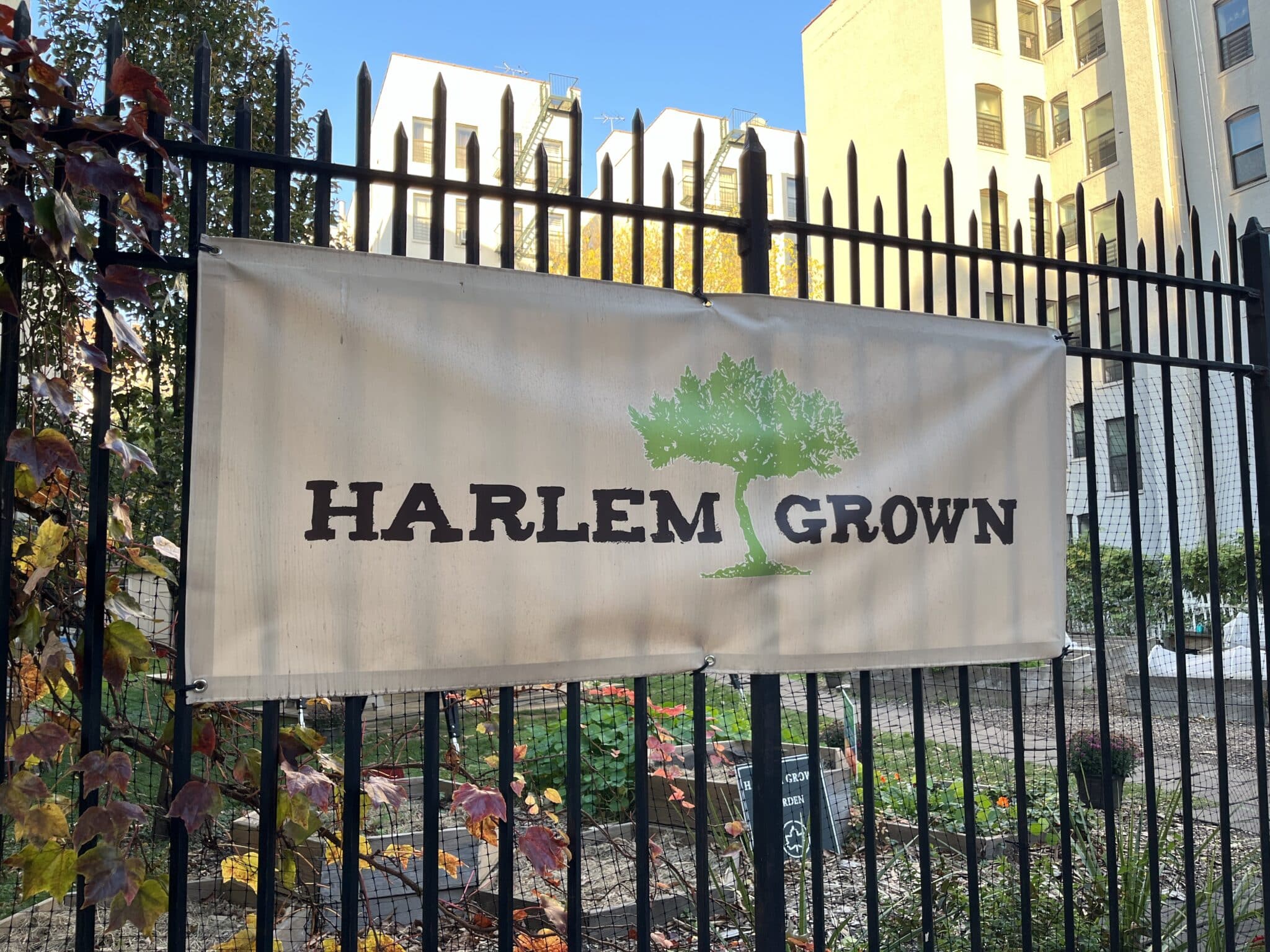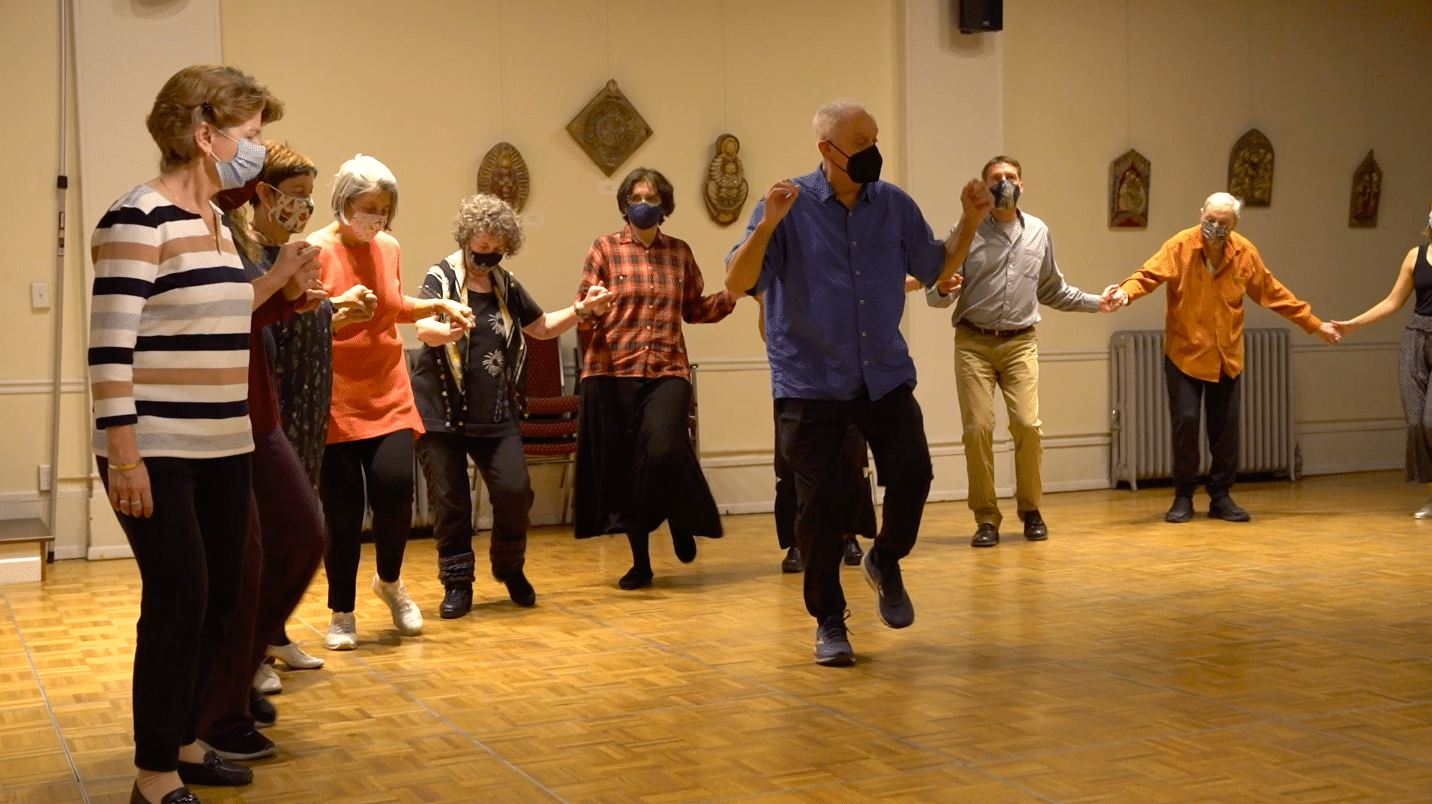Storefront mural project in East Harlem. Photo courtesy NYC.gov
During the height of the pandemic in 2021, Teresa Avila impatiently awaited the approval of her Emergency Rental Assistance Program application. The East Harlem Tutorial Program (ETHP) helped her, her husband, and her 12-year son, who is enrolled in the program. They were two months behind in rent. Avila recalled getting the call while she stood in her kitchen. The application was denied.
“I remember being surprised and sad,” said Avila, “I was scared and had a lot of anxiety because we didn’t want to end up on the streets. I had to tell my husband later while he was still desperately looking for a job.”
Since the federal eviction moratorium ended on January 15, 2022, and the state pause on evictions ended too, many Harlem families, like the Avilas, are on the verge of eviction. Some are called to court without legal representation.
“The Office of Court Administration (OCA) is moving cases four times as fast than before,” said District 7, New York City Councilperson Shaun Abreu who represents upper Manhattan.
Abreu is also a tenant lawyer and advocates for affordable housing and free legal representation when tenants face eviction, and for him it’s all too familiar. “At nine years old, I remember coming home from school to find my mom holding an eviction notice at our kitchen table,” he said. That’s a big reason why Abreu tries to offer help and support to families affected by the end of the eviction moratorium.
THE END OF THE EVICTION MORATORIUM
The moratorium, part of the Cares Act, was intended protect families from eviction during the pandemic. Since it ended, cases have filled the court dockets. Legal Services NYC, which represents many tenants, said that the OCA refused their request to slow down scheduling the appointments. Many law firms and state or non-profit legal programs don’t have enough attorneys to cover the significant number of cases because many lawyers and staffers resigned during COVID. There also hasn’t been enough time to prepare cases since the end of the moratorium. So the evictions keep coming. In New York County, 7,460 eviction filings were made by landlords, from January to May 25, 2022. That’s a stark increase from the 8,717 in all of 2021.
Not-for-profit organizations are working to connect families to free legal assistance. “Many of the families we work with are vulnerable to any kind of disruption to the economy. [COVID 19] Many of our families live in NYCHA housing or housing and secure themselves,” said Raul Soto, director of public engagement at East Harlem Tutorial Program (EHTP).
The Avia family was among 80 that completed applications with the program. Soto described the process as overwhelmingly challenging. He said, “It was a program that required a lot.”
The EHTP operates a network of after-school and summer programs, and they also help students and their families, like the Avilas, with resources. “We know that our students not only live at entities that only take place at school but also outside of school,” said Soto. The EHTP worked with the Robin Hood Foundation to open an emergency assistance program.
The Avila family was able to pay their debts at the beginning of this year when Teresa’s husband got a new job at a restaurant. Yet they and many other families continue to struggle. “All the prices are going up, for example, this month, they renewed our lease, and it went up, but we try to survive as best as we can,” said Avila.
According to a 2022 report by the New York Advisory Committee to the U.S Commission on Civil Rights, immigrants, people of color, and the undocumented communities are the most vulnerable to eviction.
“We learned that low-income communities don’t have the traditional legal protection that anyone else can afford. They get easily taken advantage of,” said Soto. “In some cases, the landlord was making handshake deals, or they are undocumented and don’t have a lease. So the landlord unreasonably increases their rent.”
RIGHT TO COUNSEL LAW ON “THE BRINK OF COLLAPSE”
There is some protection by the Right To Counsel law, enacted in 2017. It allows New Yorkers to access free legal representation or advice when facing eviction. “Tenants should exercise the Right to Counsel. But, if legal providers are rejecting their cases because OCA has failed to slow them down, are they able to exercise it?” Councilperson Abreu asked rhetorically.
“Right now, we are seeing that the right to counsel law is under siege by the OCA. Maybe within their interest is to move dockets very fast, but it comes at a cost for working families and tenants, Abreu said.
On April 18, the Legal Aid Society took the dramatic step of tweeting that it can’t handle any more cases. “Due to rising demand, we are now unable to take new Housing Court cases for the rest of April in Manhattan and BK.”
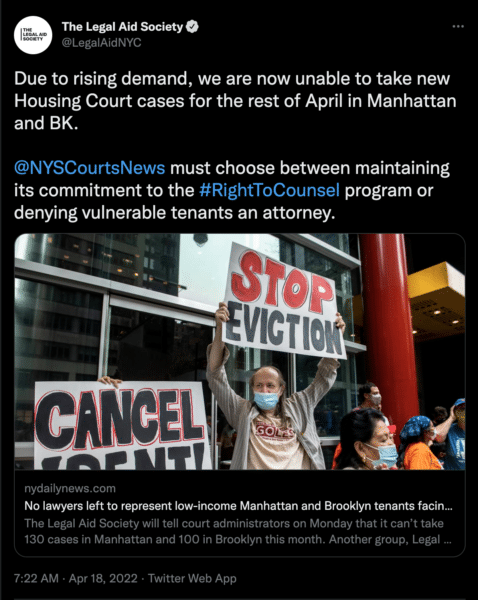
LANDLORDS AND SMALL OWNERS NEED TO EVICT
Landlords and their advocates point out that they need to pay bills and run their businesses. “The problem is looking at evictions as an immoral process,” said Jay Martin, executive director of the Community Housing Improvement Program (CHIP).
CHIP represents landlords of over 400,000 rent-stabilized rental properties across the five boroughs. East Harlem’s members own and operate more than 40 buildings and more than 3,000 apartments.
Martin criticized the way tenant assistance is handled. “For example, in the One-Shot Deal (emergency cash assistance from New York City), a tenant’s subsidy only qualify if they are being evicted and going to housing court. So, the whole process requires a property owner to make an eviction case before the tenant can qualify for that rental assistance. That’s nonsense,” said Martin.
According to Zumper’s national report, rent in East Harlem is at its highest. “The average rent for a 1-bedroom apartment in East Harlem, New York, NY is currently $2,395. This is a 20% increase compared to the previous year.”
But Martin said landlords need to increase rents to keep pace with inflation. “The cost to operate a house in New York continually goes up, so when the property taxes and insurance goes up, the rent goes up.”
That doesn’t add up for some housing advocates and public officials who want to pass a bill that would make it illegal for landlords to raise rent dramatically and evict tenants without a “good cause.”
GOOD CAUSE EVICTION BILL
“I had previous experiences where it was hard to evict tenants and one where I had to appeal the eviction case to the Supreme Court. Now, with the Good Cause Eviction bill, it will be almost impossible to evict a bad tenant,” said Peter, an East Harlem landlord. He asked us not to use his real name.
The bill, sponsored by New York State Senator Julia Salazar and Assembly member Pamela Hunter, would require landlords to have good cause to evict tenants and would prevent rent increases from 3%, or 150% of the consumer price index. According to the Community Service Society, “Good cause legislation would protect 1.6 Million households, nearly 50% of tenants statewide.”
There are some cases in which landlords dramatically increase the rent now. Senator Salazar wrote on her official Twitter account. “Just learned that a constituent in Greenpoint is being displaced, solely because their landlord is demanding that they pay a rent increase of $900/month.”
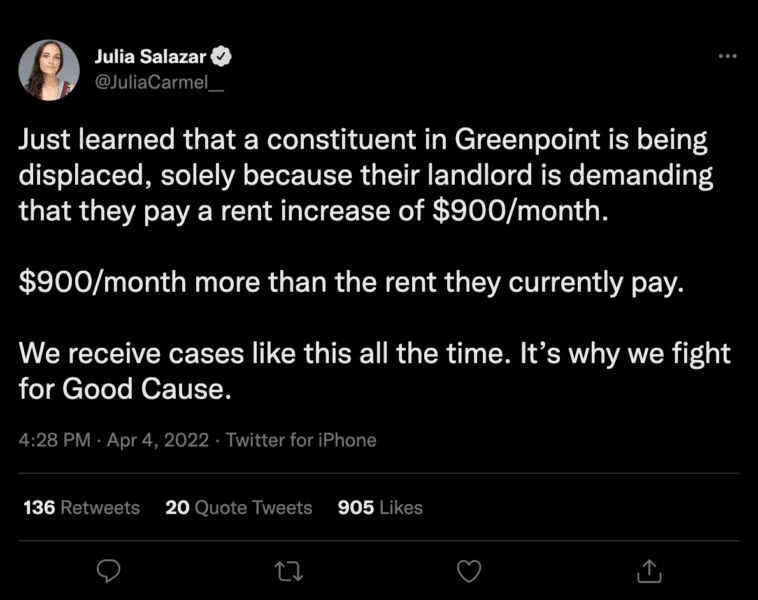
Martin doesn’t think the the bill benefit tenants or landlords. “One year a landlord may not do a rent increase. But if your boiler breaks in your building or there are significant cost increases in the operating expenses and then Good Cause exists. If there is a law that prevents you from increasing the rent to cover the additional costs, what is the process?”
The landlord we call Peter also strongly disagrees, “The state of New York will tell all landlords how much they can raise the rent,” he said. “The same body that taxes you. It is also the one telling you how much you should raise the rent? That shouldn’t be legal.”
SOME RESOLUTIONS FOR BOTH TENANTS AND LANDLORDS
While tenants and landlords debate legislation, evictions without legal representation continue in East Harlem. “We are doing tenant association workshops. Explaining to tenants how they can defend themselves against rent increases and arming them with legal resources, but a lot more needs to be done,” said Abreu. There are some proposals to benefit both the tenants and landlords, “A long-term solution is creating affordable housing, investing in more housing vouchers, providing Right to Counsel statewide, and supplementing the city’s efforts,” said Abreu.
The landlords’ representative Martin also proposes other solutions before the eviction process starts. “The government should help us to lower the operating cost. Help us lower the tax burden or subsidize directly a renter’s ability to pay before they fall behind on their rent,” he said.
Tags: Community Housing Improvement Program Community Service Society Councilperson Shaun Abreau East Harlem Tutorial Program ETHP eviction Jay Martin landlords Legal Aid Society Legal Service NYC Office of Court Administration Robin Hood Foundation Shaun Abreu State Senator Julia Salazar tenants
